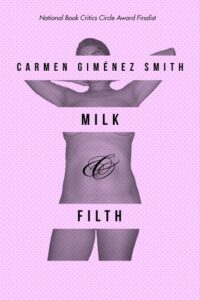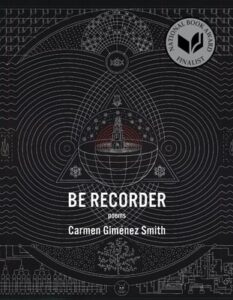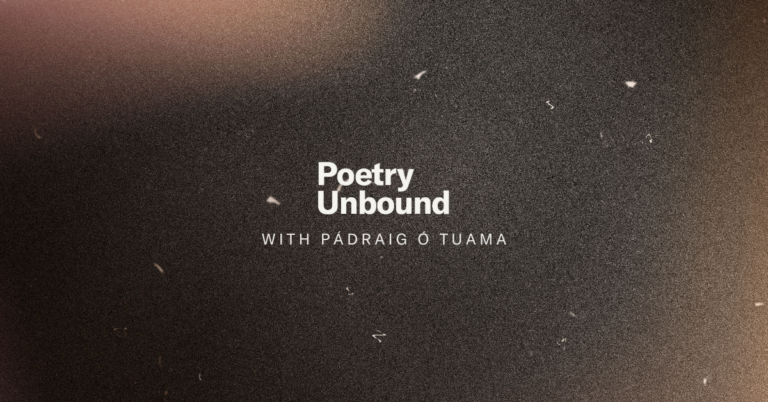Carmen Giménez
Ars Poetica
Carmen Giménez’s poem “Ars Poetica” is a stunning waterfall of words, a torrent of dozens of short statements that begin with “I” or “I’m.” As you listen to them, let an answering cascade of questions fill up your mind. What does this series of confessions reveal to you about poetry? The poet? And yourself?
We’re pleased to offer Carmen Giménez’s poem and invite you to subscribe to Pádraig’s weekly Poetry Unbound Substack newsletter, read the Poetry Unbound book, or listen to past episodes of the podcast. Order your copy of Kitchen Hymns (new poems from Pádraig) and 44 Poems on Being with Each Other (new essays by Pádraig) wherever you buy books.
Guest

Carmen Giménez is the author of numerous poetry collections, including Milk and Filth, a finalist for the NBCC Award in Poetry, and Be Recorder (Graywolf Press, 2019), a finalist for the 2019 National Book Award in Poetry, the PEN Open Book Award, the Audre Lorde Award for Lesbian Poetry, and the Los Angeles Times Book Prize. She was awarded the Academy of American Poets Fellowship Prize in 2020. A 2019 Guggenheim fellow, she served as the publisher of Noemi Press for 20 years. She is the Publisher and Executive Director of Graywolf Press.
Transcript
Transcription by Alletta Cooper
Pádraig Ó Tuama: My name is Pádraig Ó Tuama and I started writing poetry when I was 11, and I wrote it the whole way throughout my teenage years. Then I got really involved in religion when I was 18 and I didn’t write poems for a few years. And it was like they were building in me like some kind of explosion. And a few years later, I had a diary that had no lines in it. And I filled the whole thing up in six months with poem after poem. And there was one that I really couldn’t quite say where it came from. It started off with, “It appeals very much to the passionate in me.” I’ve lost that poem now. I don’t know where it is. But, I knew even as I wrote it that this was a poem about poetry in me, a poem about being pursued by poetry, about wanting it, about resenting it, about resisting it, and about how, even if I found it difficult to write, I had to write it because otherwise it would just build and build and build in me.
[music: “Praise the Rain” by Gautam Srikishan]
“Ars Poetica” by Carmen Giménez
“I’m ill I’m federal I’m on leave I’m a child of refuge I’m holy I’m a shit
I’m desperate I won’t tell you anything I’m first-gen I’m Gen X I’m tied up
I’m bipolar I’m not fertile I’m a secret I’m the now
I’m indifferent I’m a disgrace I’m funny I’m assistance I’m not saved
I was Mormon I’m atheist I’m mysterious I’m scared I’m head of household
I’m quick-tempered I’m day job I’m night-ghost I’m failure I act white
I live bankrolled I’m deliverable I’m not gang I’m crazy ex I’m
slippery I’m post-post-post I’m greedy I’m double-crossing I’m delusional
I’m above average BMI I’m hairy I’m indebted I’m weak I’m non-confrontational
I’m in therapy I’m sorry I am empowered I don’t have a tattoo I don’t have money
I have too many ex-friend I am agoraphobic I am recorder
I have a valid passport I’ve never been arrested I should have been arrested
I know too much I can barely read at times I can barely rise at times
I’m gay I’m marginally fit I’m arthritic I’m flaky
I have few skills I’m salty I’m a time bomb
I’m baptized I’m dry I’m chronic pain I’m big at mom’s house
I can’t remember how many I’m obstructionist I’m a Master
That was my confessional Thank you very much”
[music: “Cornicob” by Blue Dot Sessions]
So this poem by Carmen Giménez is titled “Ars Poetica” and that’s a title of loads of poems that are about poetry. It comes from ancient Roman poetry. There was a Roman poet known as Horace, and he had a letter poem that was an introduction to the art of poetry. And so, these days people write an “ars poetica,” it’s a bit of a throwback to him, a bit of a throw into what it’s like to write about writing and to write a poem about poetry.
There’s such irony in this brilliant poem from Carmen Giménez because it’s a poem about poetry, but it’s filled with the word “I.” “I’m this, I’m that, I’m this, I am, I’m not, I do, I don’t.” And so in many ways, it’s confronting the space between whose is the speaking voice of the poem, and then what is that saying about the broader project and human repetition of the art of poetry, because it occurs in every human culture. And there’s a space really between the, the “I” of the speaking voice and the “I” of the poet, and then the “I” of whoever it is that’s reading it, whether you’re reading it aloud like I did, or you’re reading it quietly to yourself, and then what that says about the endeavor of poetry.
[music: “Slate Tracker” by Blue Dot Sessions]
Carmen Giménez is using this poem to speak about “ars poetica,” to be a declaration of some speaking voice, but also in the last line — “That was my confessional Thank you very much.” Confessional is a term that since the 1950s has been around for a certain kind of poetry. Some people like the term, some people say that the term is a bit derogatory. Confessional poetry, technically, is the kind of poetry that explores — somebody who’s exploring parts of their autobiography. And people who’d critique confessional poetry would say, Oh, you’re just doing your therapy on paper. And others would say, No, that’s human nature. It’s a nature poem about the human side of nature. So, therefore, all of this is trying to put forward versions of an “I” that mightn’t even be representative of the individual. It might be something broader or you might be putting a caricature across or representing some kind of character.
One of the things about confessional poetry is that it can, in a certain sense, have a challenge to the reader to think, do I like this speaking voice? Do I agree with the speaking voice? Does this speaking voice speak for me? And that’s what’s so interesting about what Carmen Giménez does in all of these statements. What we realize is that the accumulation of them almost overloads you. And you know pretty much nothing about the person by the end, even though they’ve said all of these things about what they are, “I’m holy,” “I’m Gen X,” “I’m agoraphobic,” “I have a valid passport,” “I’m salty I’m a time bomb,” “I’m chronic pain.” The buildup of all of these means that you realize we can never fully represent ourselves. So that’s what I love about this poem. She has used hyperbole to say that even this form can never fully get to the end about what a poem is or what a person is.
[music: “Creatures of Myth” by Gautam Srikishan]
All we have on the page of this poem are these statements, and it is hard to know if even the person who’s writing them believes them about themselves. Or maybe there are things that have been said about them. “I act white,” “I’m crazy ex,” “I’m not gang.” Those things might be put across to them as something that someone else has said that they’ve internalized even if they don’t want to. Most of these statements have this gap between them. The lines are long in this poem. For instance, the first line says, “I’m ill I’m federal I’m on leave I’m a child of refuge I’m holy I’m a shit.” That’s all on the first line. But in between each of these statements, there’s no full stop, no period. But there is a, a caesura, a gap. And sometimes even the statement itself has a gap between it. “That was my confessional,” is how it goes at the end.
There’s so much space in between each of these statements and sometimes within the statement that you find yourself looking at this poem or hearing this poem and thinking, what is this saying about who the person is proclaiming that they’re not, or ways within which any statement like this is insufficient. It can never fully describe somebody. And at times it might even be completely inaccurate. But there’s ways within which we say all of these things to ourselves, that we are being confronted with these.
Of course, then I find myself adding to it to think, what would I say today? What wouldn’t I say today? What have people said about me? What have I tried not to believe? And so this poem on the page, even though I think it’s kind of an experiment on the page saying language will always be insufficient to describe who any individual is, it does beg for a response from any of us who are listening to it or reading it to think, What is it that I carry even if I don’t want to carry? And what’s the space? What’s the gap? What’s the silence in between all these statements of “I” that I might be tempted to say even if I don’t like them?
[music: “Ashed to Air” by Gautam Srikishan]
Carmen Giménez has published a bunch of books of poems. She works in poetry as well she’s the executive director of Graywolf Press and the publisher there, too. And this poem, I read it years ago when I saw the book, Be Recorder. It’s the final poem in the book. And so the final line in the whole book is, “That was my confessional Thank you very much.” There’s playfulness within it, and there’s a way within which by saying one thing — “That was my confessional Thank you very much” — all of the spaces on the page and the voice on the page, too, invites us to think, what is happening in a poem? Who is the person who’s speaking in the poem? And will they always be that, even if it was true at the time they wrote it, maybe things change by the time that it’s being read or it’s being read years later? Like it’s being now. This poem has been in the public record for, I don’t know, at least five years. I think the book came out in 2019. And so I love how the poem here, the “Ars Poetica” poem, is pointing beyond the poem to say that there’s all kinds of things that will need to be confessed. “Thank you very much.”
[music: “Our Ears, Deceivers” by Blue Dot Sessions]
“Ars Poetica” by Carmen Giménez.
“I’m ill I’m federal I’m on leave I’m a child of refuge I’m holy I’m a shit
I’m desperate I won’t tell you anything I’m first-gen I’m Gen X I’m tied up
I’m bipolar I’m not fertile I’m a secret I’m the now
I’m indifferent I’m a disgrace I’m funny I’m assistance I’m not saved
I was Mormon I’m atheist I’m mysterious I’m scared I’m head of household
I’m quick-tempered I’m day job I’m night-ghost I’m failure I act white
I live bankrolled I’m deliverable I’m not gang I’m crazy ex I’m
slippery I’m post-post-post I’m greedy I’m double-crossing I’m delusional
I’m above average BMI I’m hairy I’m indebted I’m weak I’m non-confrontational
I’m in therapy I’m sorry I am empowered I don’t have a tattoo I don’t have money
I have too many ex-friend I am agoraphobic I am recorder
I have a valid passport I’ve never been arrested I should have been arrested
I know too much I can barely read at times I can barely rise at times
I’m gay I’m marginally fit I’m arthritic I’m flaky
I have few skills I’m salty I’m a time bomb
I’m baptized I’m dry I’m chronic pain I’m big at mom’s house
I can’t remember how many I’m obstructionist I’m a Master
That was my confessional Thank you very much”
[music: “Praise the Rain” by Gautam Srikishan]
Chris Heagle: “Ars Poetica” comes from Carmen Giménez’s book Be Recorder. Thank you to Gray Wolf Press who gave us permission to use Carmen’s poem. Read it on our website at onbeing.org.
[music: “Praise the Rain” by Gautam Srikishan]
Poetry Unbound is: Gautam Srikishan, Eddie Gonzalez, Lucas Johnson, Kayla Edwards, Tiffany Champion, Cameron Musar, and me, Chris Heagle.
Our music is composed and provided by Gautam Srikishan and Blue Dot Sessions.
This podcast is produced by On Being Studios, which is located on Dakota land. Open your world to poetry with us by subscribing to our Substack newsletter. For links and to find out more visit poetryunbound.org.
Books & Music
Recommended Reading
The On Being Project is an affiliate partner of Bookshop.org and Amazon.com. Any earnings we receive through these affiliate partnerships go into directly supporting The On Being Project.











